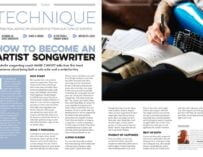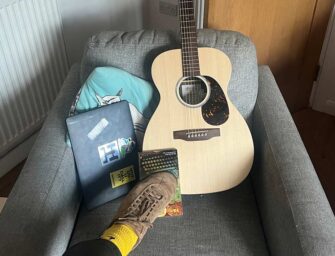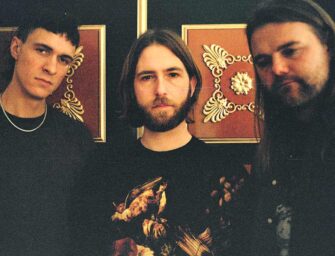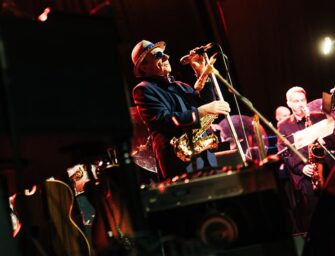
Nerina Pallot was a publisher’s assistant at the record label Mute: “I made a cup of tea for David Bowie.”
As a songwriter, musician and label owner, this female artist has forged a career full of surprising twists and turns
Nerina Pallot spent 2014 releasing a different EP every month, a bold move to bridge the gap between her previous album Year Of The Wolf and her upcoming record The Sound And The Fury. In many ways it should come as no surprise that Nerina would follow such a route, as an artist she’s always been bold enough to forge her own path. After the success of her second album Fires, which spawned her biggest hit Everybody’s Gone To War and the fan favourite Sophia, she has continued to evolve – a decision which may have come at the expense of huge sales but has allowed her to write music that is both challenging and accessible. This is most evident on her latest album, co-written with and produced by her husband Andy Chatterley it is a state of the nation address which will surprise the casual listener.
Ahead of The Sound And The Fury‘s release, Songwriting caught up with Nerina to talk about the new album, writing for Kylie Minogue and the advantages of owning your own record label…
What’s in Nerina Pallot’s Songwriting Survival Kit?
How did you get into songwriting?
“I was musical from a really young age. I started picking out notes on the piano when I was four and then I pestered my parents for lessons. The teacher said ‘she’s too young’ but she had a little hut where the lessons were and I sat outside and staged a protest until she agreed to take me on. My mum did a really cool thing and decided to learn to play at the same time as me. I quickly overtook her but it was really helpful. I can remember being six and before I would go to school I would sit at the breakfast table practicing drawing treble clefs and bass clefs, I was just fascinated with it. I started singing lessons when I was nine and violin when I was eleven and then I just carried on through. When I was sixteen I won a scholarship to a school in England that had a very strong music department and so I went there.
I WRITE SONGS BECAUSE I DON’T KEEP A DIARY… THEY’RE MY WAY OF DESCRIBING HOW I FEEL ABOUT THE WORLD
“I went to a school called Wellington College where there were loads of choirs and orchestras and I just became really immersed in it, but it was almost too much so, when it came to A-levels, I decided to go to art college and study painting. My rebellion was painting. I loved it but moving to London meant I was just joining bands more than ever and so, after about two years of that, I decided to study music. It was great but I was also working on other people’s records, playing keyboards on dance records and stuff like that, so I actually left and went straight into the music business. I was doing cover gigs and working for the record company Mute in their publishing arm, Mute Song. I was a publisher’s assistant and that was phenomenal. I learnt so much about the business of songwriting and I got to meet some really great songwriters. I made a cup of tea for David Bowie on my first day there. I love pop, my heart is very pop, but Mute was very leftfield and it opened me up to a whole other world that I hadn’t previously delved into. I met people from [London post-punk band] Wire and it just was an education and broadened my songwriting interest.”
Who were your previous influences?
“Early on it was all about soul; Michael Jackson, Stevie Wonder and classic Motown. When I was a teenager I worshipped at the temple of Lenny Kravitz – I thought he was god. I loved Sly And The Family Stone and I still do. When push comes to shove, if I’m going to put a record on I’m going to put on Sly or Bill Withers or Nina Simone, that’s what I grew up with and what I love first and foremost. From a lyrical point of view it was always Kate Bush and Joni Mitchell.”
When did you start writing lyrics for yourself?
“I think I was about nine or ten. My first song that got performed was when I was 13. It was for a school competition and it was really bad, my whole year sang it. I think I made my first demo when I was 14 or 15.”
Had you moved to England at that point?
“My first demo was in Jersey and then I started to make them with a friend from school called Tim Clarke, who now does a lot of film sound engineering. He wanted to have a studio and needed artists to work with him and it went from there. He was my sound guy until about 10 years ago. It was amazing to have someone I’d grown up with to hold my hand through it all.”

Nerina: “I’ve tried to be an artist that doesn’t belong to a particular tribe and doesn’t give a shit about all that.”
Did you always have a vision of the type of artist you wanted to be?
“No, I’ve never been careerist and I sometimes regret that. I’m just too lost in the world of song. I suppose it’s a good thing, but I’ve never tried to be cool. I like lots of things that are deemed to be cool. I love The Smiths because they just describe my teenage years so perfectly, but I would listen to them and then quite happily listen to Kylie Minogue and love both things equally. If I’ve done anything, I’ve tried to be an artist that doesn’t belong to a particular tribe and doesn’t give a shit about all that. I just love music.”
Do you think that not being careerist allows you to make an album as eclectic as The Sound And The Fury?
“Maybe, but for me it’s about making the music that is coming most naturally at any given time. I write songs because I don’t keep a diary and I guess they are my way of describing how I feel about the world. Every record will be different because I feel different. But yes, it is eclectic, which my hardcore fan base will like. My fans are so wide ranging; some of them are complete metal-heads, some of them are massively into soul and some of them love singer-songwriters. I’ve never been consistently of one genre.
“What’s interesting to me is that the casual listener has a view of what I do and yet, for me, The Sound And The Fury is as much me as Fires is. If you put all my albums together, you wouldn’t necessarily know that it’s the same artist, which is frustrating from a labels point of view and from a career point of you, but as an artist it’s really satisfying.”
I FEEL BRITISH, BUT I HAVE VERY LITTLE ENGLISH BLOOD IN ME
Is that why you released the album on your own label?
“It’s more to do with market forces. I’m definitely more of a niche artist now. I’m 41 so, even if I came out with a very pop record, I think it would be unlikely that a label would get behind me, because it is a youth market. I also wouldn’t have been able to do what I did last year where I released an EP every month. They just wouldn’t go for that kind of thing. Last year was the first time in my life that I’d started to make any money out of record sales, as I’d done it all myself. So I started thinking, ‘Really, am I going to go back down that road where I give away 90% of the profits to a label?’
“I really enjoy doing my own thing and I’m lucky enough that I have amazing fans that allow me to do it. But I’m not going to bitch about labels; they’ve enabled me to do so much and I have so many good friends in labels who are great people that work really hard and love music. I had a career because Warner picked up my second album. I put it out on my own label to begin with and Warner came in and gave it an injection and then I had a hit and built a much bigger fan base. I have a great relationship with Universal too.”
Were the EPs a way of trying to get out of the cycle of recording and touring?
“It was a bit of that. Around November 2013 I made an EP in a day with my band and we just had so much fun. It was really satisfying to see something come together so quickly, and around then we had the idea to make one every month. It was also because I had started work on The Sound And The Fury and it felt quite different from where I’d left off with Year Of The Wolf, so the EP project was a way to take my fans on a musical journey towards where I was going next. I wanted them to be part of the process.”
Did you enjoy it?
“I did, although there were times about four EPs in where I started to go, ‘Oh my God, am I really going to do this?’ It was really tough and then I decided to change it up, so in the middle of the year I made a really poppy tune called When I Grow Up. Basically they were songs that I had started hatching when I was working with Kylie that I’d never really finished. At the time, the Daft Punk album was massive so there’s a song on that called Simple Life, which is really an homage to them and that was great as it broke the writer’s block. The one after that was Rousseau which obviously isn’t anything like that. It was great and really opened up the writing.”

Nerina: “You must follow your own path, you must block out the noise of the world and just do what you have to do and do it right.”
How would you describe the themes of the new album?
“The birth of it was quite political, but I don’t think the album is overtly political. I think the catalyst was when Lee Rigby was murdered in Woolwich. I was born around the corner from the road he was killed on and it really struck a nerve with me for so many reasons. I just thought it was horrific. I can’t explain how awful I felt every time I saw any picture of his little boy, who was only a few months younger than my own son. I became really worried for the community because they were local boys who did it, who had this massive hatred, and because it’s a place where a lot of immigrants have made their home. My mum came to Woolwich from India in the 1960s. So, in a weird way, migration was in the back of my mind because I was thinking about how we define ourselves as British.
“I feel British, but I have very little English blood in me; my dad’s ancestry is half French and my mum is Indian. As a kid growing up in the 70s and 80s, immigration was a relatively new thing – there weren’t many Indian people on telly or things that I could relate to. I definitely felt English but would sometimes feel like everybody else was blonde-haired and blue-eyed. Now, when you look on EastEnders, there are a lot of different people on there and it’s a lot more diverse. There’s a burgeoning English-Asian music community and that’s really heartening for me, but I was trying to understand what my background was; how I felt British and I didn’t feel disenfranchised in the way that the guys that had done this awful thing might have felt.”
Did the song The Road come directly from that?
“The Road was inspired by the book of the same name by Cormac McCarthy – I was thinking about the ending where he dies and his son is left to carry on and we don’t know what happens to him. The key thing that I took from that book was how the children kept their morality while all sorts of horrible things are happening, like cannibalism, and how I really believe that human beings have a moral compass. It’s not to do with religion, it’s just knowing what is right and what is wrong. I wanted to do something that took from his stylistic way and write a song for my son, like a modern version of the poem by Rudyard Kipling If. You must follow your own path, you must block out the noise of the world and just do what you have to do and do it right.”
IF I WEAR MY SKIRT SHORT IT DOESN’T MEAN I DON’T HAVE A BRAIN
Is that mirrored on If I Had A Girl – are those the lessons that you would want to pass on if you had a daughter?
“Exactly, I was thinking about how it’s not easy for boys growing up, but it is even harder for girls. It’s much less prescriptive for men than for women. If you go to a supermarket and look at all the magazines on the rack, 80 percent of them are sold to women and they’re telling them if you wear this or you do this diet you’ll be better, whereas men are not told that. All the interesting and fun stuff – the music magazines, the fishing magazines, the car magazines – all the cool shit, is sold to men. Women are never sold things to broaden their minds.”
Does the song address specific problems you’ve faced as a female artist/songwriter?
“No, because I’ve never really gone down the path of wearing miniskirts. When I was writing the song there was the whole thing about the footballer Ched Evans and the fact that the girl was inebriated, as if that mitigated what he did to her. Then Michael Burke made a comment about it and I remember thinking that, regardless of the situation, a decent man or woman wouldn’t take advantage of someone if they’re inebriated. It doesn’t matter what state that person is in, you just don’t rape them.
“Also, I see that there is oppression in a lot of beliefs and faiths, but at the same time think women should be free to wear whatever they want. There’s a line in the song: ‘If I wear my skirt short it doesn’t mean I don’t have a brain / but if cover myself from head to toe it doesn’t mean that I’m in chains.’ I have friends who wear hijabs and they’re not oppressed; they’re totally modern women who have a faith and want to embrace it. Women are always this war-ground for politics, for religion, for the way our children should be raised. It’s always over women’s bodies and what we wear and that’s what I wanted to talk about.”
Do you see it as your obligation as a songwriter and someone in the public eye to reflect on what’s going on in the world?
“Because I’m interested in the world, I’m always going to write about what I see. But I do feel that, if you have an opportunity to be on the radio or TV, don’t squander that three-and-a-half minutes – do something with it. You don’t have to write a Live Aid song, but you can still do something that makes people think. The writers that have inspired me did it, like Stevie Wonder. A lot of Song In The Key Of Life and Innervisions are really political, but he does it with great melodies and it’s like sleight of hand; they’re pop songs which are political at the same time, and they mean a lot to me because of that.”

Nerina Pallot: “I’m not a very good co-writer, I really struggle with my self-consciousness; I get shy.”
So if you’re writing for Kylie or Diana Vickers, do you approach it in the same way or is it a different process?
“It’s interesting because when I wrote for Kylie, one of the songs she covered was one that already existed. I was going to put it out as my own song and she heard it and wanted it, so I wasn’t writing it with her in mind. Then I started to work with her and I did write her a song called Aphrodite. That was really great because I sat with her and chatted about where she was in her career and her legacy and all the amazing things that she stands for, but at the same time trying to make it really feminist and empowering, because that song is a celebration of womanhood. It was great because I was able to get my own take in it, but also make it with her in mind.
“With Diana it was a song that I had already written. We did write together, but in the end she picked one that was already there and what was really weird was that it was a really personal song. I wrote it when my father was ill and it was a bit touch-and-go; I would always fall apart when I sang it, but when she sang it she was that one step removed, so it really worked.”
Are you looking to write more songs for other people in the future?
“No, I really don’t like it and I really don’t enjoy it. I’m not a very good co-writer, I really struggle with my self-consciousness; I get shy. I look at someone like Sia and think she’s amazing. She’s a great artist in her own right, but she has this ability to write with other people too. I don’t have that ability. I’m rubbish at it.
I DO REVERE THE ACT OF SONGWRITING AND THE MOMENT A SONG ARRIVES
“After I worked with Kylie the phone kept ringing for a bit and I did do a lot of work with other people – and this sounds really awful – but I am slightly concerned about working with certain artists who never write on their own. Kylie’s different because I worship her and she is someone who will just pick the best song – it doesn’t matter if she’s written it or not – and I love that about her. But, I think, because of the way the pie is decreasing in terms of music revenue, there are lots of artists who years ago wouldn’t be pushed to write, but now their management is pushing them to, as it’s another potential revenue stream. So sometimes you work with people who are not writers and it’s like pulling teeth. I’m not going to name names. It’s put me off the whole process.”
But you write with Andy, is that easier because of your intimate relationship?
“Yes, there’s no self-consciousness because he’s my husband so I can be completely myself. We write remotely as well. Often we’ll come up with a sketchy idea and I’ll take it, put on my headphones and go for run, sit with it for a few days and then bounce it back and forth. I actually don’t like writing in the studio because I’m a very fast writer – all my best songs tend to take 10 to 15 minutes.”
Where do you normally do your writing?
“In my kitchen. My favourite song – which I think is one of my best ever songs but hardly anyone knows it – Love Is An Unmade Bed, I literally had an hour-and-a-half to write it. I had to finish an EP and my kid was really little and I’d get one hour a day when he would nap. In that one hour I roasted a chicken, wrote that song and demoed it. Then, when he woke up, I took him to the studio and recorded it and it was really good having that tight time period.”
Finally, we heard you on the radio recently saying that your songs tend to arrive fully formed. Can you elaborate on that idea?
“The funny thing is I have no reverence whatsoever for the act of being a musician. In historical terms, we were always troubadours and were never paid and never venerated. I think the whole idea of celebrity is abhorrent, but I do revere the act of songwriting and the moment a song arrives. I don’t think that the songs belong to the writer; they had to come into being and you’re just a conduit. So I have great reverence for the actual moment of creation. It sounds a bit woolly-headed, but I feel like it’s a universal consciousness speaking through you and you just happen to be the person who gets that song on that day. The rest of it is all rubbish to me.
“The songs you like the most you almost feel like you weren’t there when they came. It’s not just songwriting. I talk to people who paint, make films and write books and they always say that, for their best work, they took themselves out of their body for a moment and they didn’t get in the way. I don’t think you can ever explain it.”
Nerina Pallot’s album The Sound And The Fury is out now on Idaho Records. The lead single Rousseau is out now and you can watch the video below. For more, go to nerinapallot.com
Click here for more interviews

































Related Articles